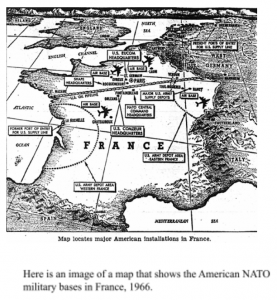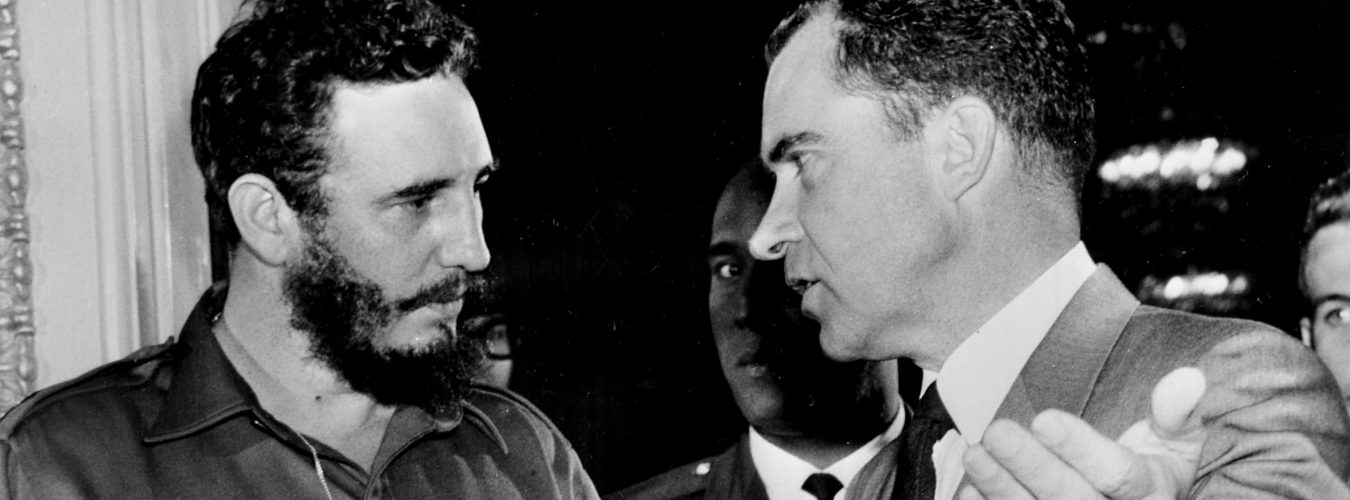In 1966, French President Charles de Gaulle announced in a letter to President Lyndon Johnson that France would be withdrawing from NATO’s integrated military command structure. In a very polite manner, de Gaulle wrote to Johnson that “France [was] determined to regain on her whole territory the full exercise of her sovereignty,” and therefore, “no longer [placed] her forces at the disposal of NATO.” Although de Gaulle stated that France planned to modify the form of their alliance within NATO without altering its substance, it’s military withdrawal shocked the other member nations and placed the United States as the central reason for France’s decision.
France originally joined the North Atlantic Treaty Organization during its formation in 1949 after the end of WWII when their nation, along with many others, was struggling to rebuild its economy and ensure its security. More specifically, NATO was founded out of fears for the Soviet’s nuclear weapons and was organized to help dictate how member states would contribute towards military action if needed. However, as the Cold War era moved into the 1960s, France began to witness conflict with other NATO allies, including the United States. Reasons that pushed de Gaulle’s decision to leave NATO included his failed proposal that had suggested France, Great Britain and the United States to have an equal nuclear strategy within the organization. In the 1960s, the US dominated NATO to focus on developing a new nuclear strategy, which frustrated de Gaulle since it ultimately suppressed France’s voice within the organization. Moreover, part of de Gaulle’s decision to pull out of NATO was due to developments in the East and the shift to more diplomatic relations with the Soviet Union in the wake of the Cuban Missile crisis. De Gaulle believed that France’s estrangement from NATO could be used as an asset in reaching out to the East and potentially contribute to the dismantling of tensions on both sides of the Iron Curtain. In short, de Gaulle’s withdrawal from NATO stemmed from reasons regarding decision-making conflicts with the US and increased cooperation with the USSR. His decision was not only the result of the general’s quest for independence, but also designed to promote his vision of a new European order between the East and the West.

Although France’s withdrawal from NATO shocked the affiliated nations, US newspapers recognized that US dominance had triggered France’s actions. In an article published in The New York Times before de Gaulle’s official withdrawal, the US recognized that France was pushing for reform within NATO since American forces dominated the alliance and drove a wedge in their attempt to increase European integration. The article coverage recognized de Gaulle as an advocate for a more cohesive balance of power in Europe and also recognized that “the strategic air commands and American missiles are what deter the Soviet Union from any adventure in Europe.” The United States’ military power stood in the way of European nation’s development with the USSR, which Americans ultimately recognized. Other New York Times articles emphasized de Gaulle’s concerns with the NATO alliance and suggested NATO’s next steps should be led by European nations rather than the United States. The general consensus of the New York Times writers and editorial board is that European nations should “make it clear to Washington that continued American predominance cannot save NATO, but only destroy it.” Although the United States did not support de Gaulle’s decision to leave NATO, it was a decision backed up with many legitimate reasons since European integration and balance of power was the forefront mission for France at the time. Moreover, the US foreign policy in Vietnam further tainted France’s view of American military operations and factored into de Gaulle’s decision regarding NATO.
Works Cited:
Bozo, Frédéric. “France, ‘Gaullism,’ and the Cold War.” In The Cambridge History of the Cold War, eds. Melvyn P. Leffler and Odd Arne Westad. New York: Cambridge University Press, 2010
De Gaulle, Charles. “Letter from President Charles de Gaulle to President Lyndon Johnson on France’s withdrawal from the NATO command structure.” Permanent Representation of France to NATO, March 7, 1966.
Middleton, Drew. “De Gaulle and NATO: His challenge to the alliance poses large questions for its future.” New York Times, May 03, 1964: E11
“NATO can be saved.” New York Times, Mar 20, 1966: pg. 220
Image:
Tribune, International Herald. “1966: France Finished With NATO.” New York Times, February 22, 2016.
